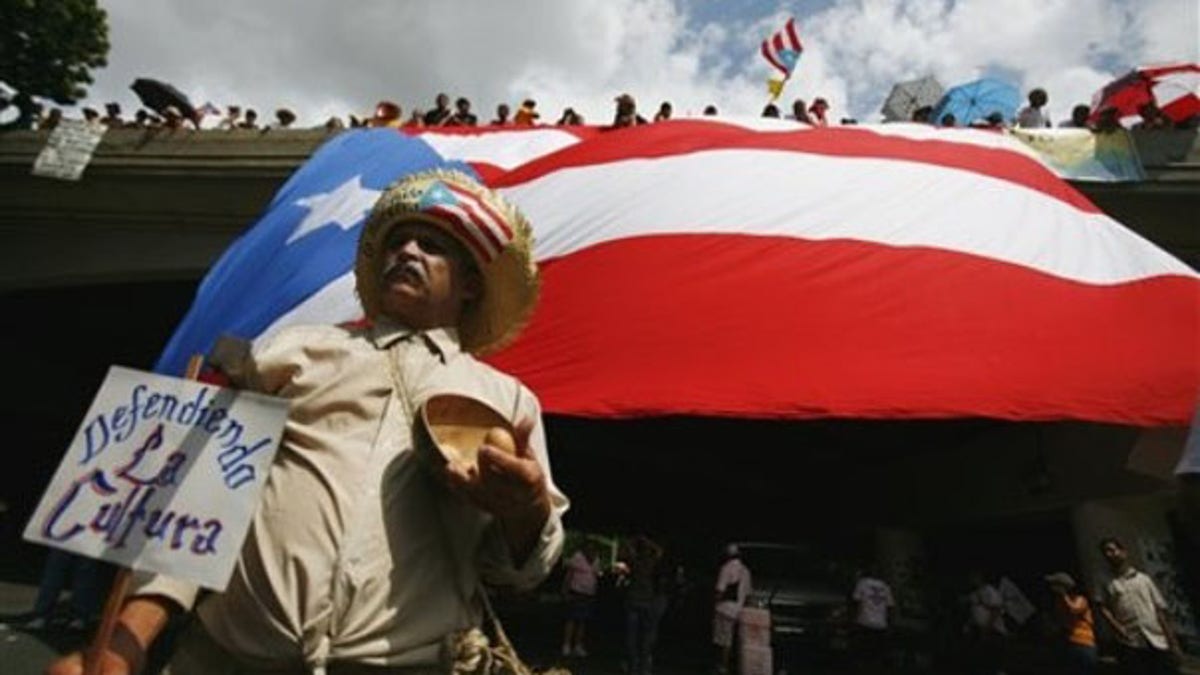
A demonstrator marches under a Puerto Rican flag in San Juan Oct. 15, 2009. (AP Photo)
The U.S. House is voting Thursday on a bill that allows the government in Puerto Rico to ask its residents if they want to change the island’s commonwealth status, in what critics are saying is a backdoor attempt to force Puerto Ricans into choosing U.S. statehood.
Puerto Rican voters repeatedly have shot down the idea of statehood over the past several decades, but the bill under consideration would call on the commonwealth to continue bringing the question before the voters.
Rep. Jason Chaffetz, R-Utah, said that while Puerto Rico doesn't need congressional authorization to hold such a nonbinding vote, the bill could be a game-changer.
He described the effort as part of a plan to give the island's progressive activists "legitimacy" to push forward with and build momentum toward a statehood plan. He said it's something most Puerto Ricans don't even want, but suggested it was part of an effort to bring more Democrats into Congress.
"That's what some of us who understand this bill are so just frightened about," Chaffetz told radio and Fox News host Glenn Beck. "The majority of people in Puerto Rico don't even necessarily want this."
The bill sets out a two-stage process. First, a referendum would go to Puerto Ricans asking whether they want to change their political status or keep it the same. If they vote to stay the same, the bill authorizes Puerto Rico to call the question for a vote every eight years.
If they vote to change their status, then it would allow Puerto Ricans to pick from one of three options: independence from the United States, a different kind of "political association between sovereign nations" or U.S. statehood.
The vote is nonbinding, and even if Puerto Ricans chose statehood, the U.S. Congress would have to approve it.
There's an advantage for Puerto Ricans to opt out of statehood. Under the territory's current status, residents pay no federal tax on income earned inside Puerto Rico. They do not vote for president or have a voting representative in Congress. But they participate in the presidential primary process and have a non-voting delegate in the House of Representatives, like the District of Columbia.
Chaffetz said the bill would allow Puerto Rico and the United States to push forward with plans for a 51st state with just a "very, very small margin" in support of the idea. From there, he said, a slate of new senators and representatives would be coming to Washington.
Chaffetz said 2.5 million people born in Puerto Rico but living in the continental U.S. would also be allowed to weigh in on the vote.
"That is just absolutely unbelievable to me. I just can't believe that they are going to allow somebody who's now living in Chicago to be voting on this bill in Puerto Rico," he said.
Rep. Luis Gutierrez, D-Ill., whose parents were born in Puerto Rico and who represents part of Chicago, slammed the bill on the House floor Thursday morning, calling it a device to "impose" statehood on residents who have repeatedly rejected the idea.
"Really it's designed to get one thing and one thing only, and that is to have the people of Puerto Rico accept statehood for themselves," he said. "Why don't we accept their wishes? … It's spelled the same in English as in Spanish: N-O. No. No."
But the bill has scores of sponsors in the House from both sides of the aisle. It was introduced by Pedro Pierluisi, Puerto Rico's representative in the House and a member of the New Progressive Party in Puerto Rico, which advocates for statehood. Pierluisi said Thursday that the bill addresses a "longstanding problem."
"Patience is a virtue, but my people have been patient enough," he said.
Backers of the bill say it's a critical step toward supporting Puerto Ricans in setting their own future.
"The bill is based on the most fundamental democratic principle -- the right to self-determination," Rep. Jared Polis, D-Colo., said on the floor Thursday. He said that while Puerto Ricans are U.S. citizens, they deserve to have "several congress-people with full voting rights" representing them.
A letter from Democratic and Republican representatives this week urged colleagues to support the bill.
"The U.S. citizens of Puerto Rico have never expressed their views, in the context of a vote sanctioned by Congress, on the island's political status. This contradicts our nation's commitment to democracy and self-determination," the letter said.
Click here to read Rep. Jason Chaffetz's interview with Glenn Beck.




